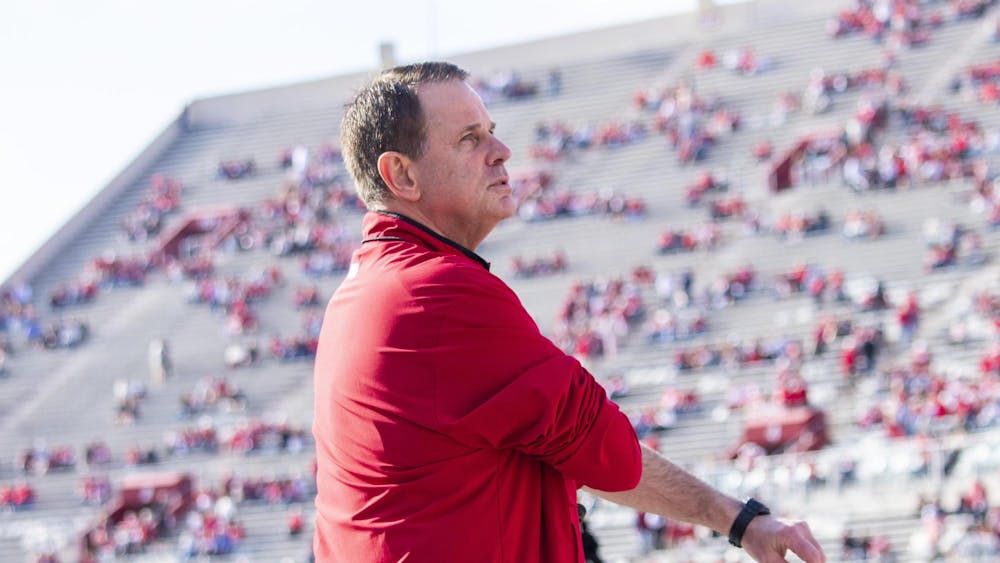Everyone knows America is getting fatter. The question is what to do about the expanding waistlines plaguing so many people in today's super-sized society. Lloyd Kolbe, professor in the department of Applied Health Science, has identified 23 ways that schools, including IU, could work toward reducing the number of overweight and obese Americans.\nKolbe said that children are growing up without healthy-weight role models, creating a cycle of over-eating and under exercising.\n"At this point in history, we calculate that 64 percent of adults are overweight or obese," he said. "Our young people are seeing as they grow up that the norm is being obese. The rate of obese teenagers and children has tripled and hasn't shown any sign of stabilizing."\nKolbe said many shifts in society and behavior have combined to create an obesity epidemic. Increased consumption of calories and decreased amounts of physical activity are major factors.\nKolbe said he recalls growing up when during a time when far fewer people were obese.\n"On the rare occasion me and my sister would split a Coke, that was 7 oz.," he said. "I remember having to push the lawn mower. Now people have riding lawn mowers."\nBut, Kolbe said all these factors added up, there is no reason to blame young people or label them as lazy. He stresses the consequences of environmental changes which need to be addressed quickly.\n"We need to be careful about ... victim blaming," he said. "We do not want to create more stigmas for young people or adults who for many reasons may be overweight."\nOne place the lack of role models for young people can be addressed is within U.S. school systems. With 53 million students, and 5 million employees in the nation's K-12 schools, Kolbe said he believes schools have a unique duty to educate students about these issues. \n"Schools are more focused on test scores and place less importance on physical activity," he said. \nPolicies Kolbe suggested include recess that requires 30 minutes of moderate to vigorous physical activity every day and counseling and weight control programs available for needy students and families. \nMost of his policies are aimed at K-12 schools, Kolbe said. But can be applied to IU. \nBut, IU already offers services for students hoping to lose weight through the Health and Wellness center on the fourth floor of the Health center. More importantly, many of these services are free to students as part of the fees they already pay.\nDawn Lukas, a registered dietician at the Health Center, said in the 20 years she has been with the University, IU has always been concerned with obesity, though the problem is in the limelight right now.\nLukas also said she feels education is key to changing unhealthy habits.\n"A lot of people growing up now have never seen what a true portion size is," she said. "It takes a lot of education to help people understand their body needs to have healthy food, and if you try and survive on only fun food, you have a lot of extra energy you have to burn off."\nLukas sees free services such as fitness assessments and consultations and nutritional counseling as major benefits of being an IU student.\n"In the community, (my appointments) would cost a lot and you would have to have a doctor's referral," she said. "You don't have to be ill for a wellness check up. Whether overweight or obese or underweight you can come in and get medical nutritional therapy."\nLukas also said she suggests students visits www.mypyramid.gov, where they can personalize a food pyramid for themselves based on factors such as height, weight and physical activity. According to the Web site, one size doesn't fit all and says the MyPyramid plan can help people choose the foods and amounts that are right for them.\nThough Kolbe said society as a whole is more aware of health problems associated with obesity, he believes in the end the major motivation to lose weight will result from increased economic costs.\n"Obesity has the potential to really ruin businesses and industries by increasing the health care costs for their employees," he said. "In an increasingly aging society we are just beginning to see the health care costs spiral out of control. There is no way we will be able to pay the bill in the future"
Professor targets obesity
Portion size, exercise important for keeping healthy
Get stories like this in your inbox
Subscribe




